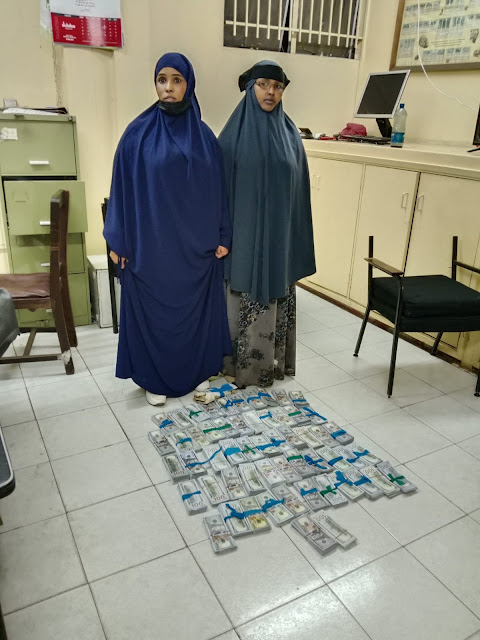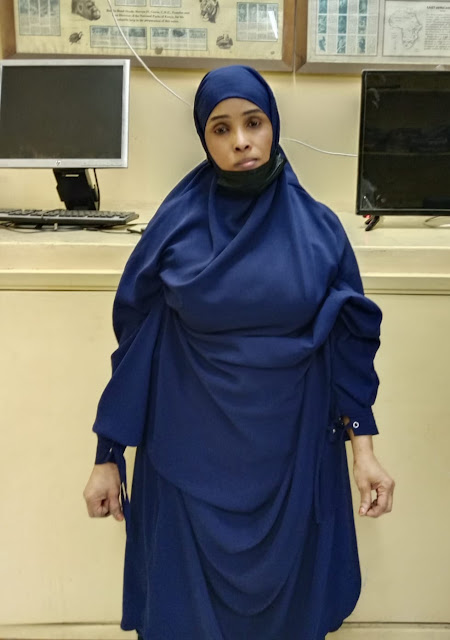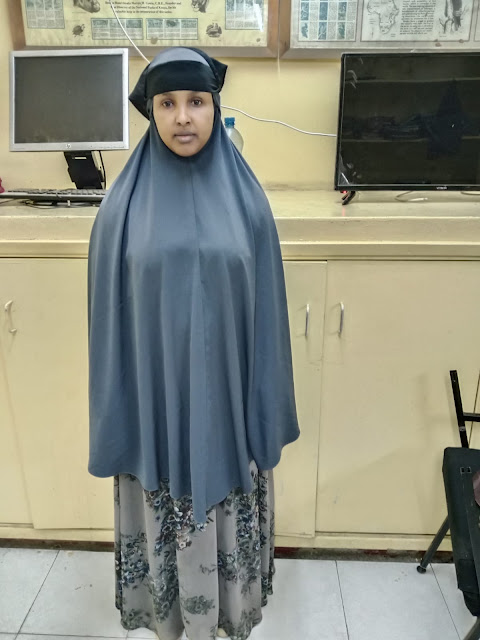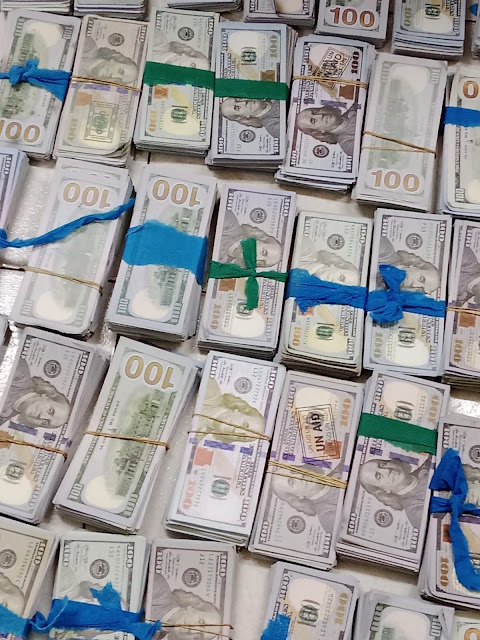In a dramatic and meticulously executed operation, detectives from the Directorate of Criminal Investigations (DCI) Nairobi regional office have apprehended two women in possession of a substantial haul of counterfeit US dollars, marking a significant blow to financial crime in Kenya. The arrests, which took place in Nairobi’s Upper Hill area, uncovered USD 560,000 in fake currency, equivalent to approximately Ksh 70 million at current exchange rates. This seizure represents one of the largest counterfeit currency busts in recent Kenyan history, underscoring the growing sophistication of criminal networks targeting the country’s economy.
The DCI announced the arrests in an official statement, detailing the intelligence-driven operation that led to the capture of the suspects, identified as Ifrah Ali Jeyte and Qamar Salat Abdi. “Acting on solid intelligence, detectives conducted a well-coordinated operation in Upper Hill where they arrested the female suspects,” the statement read. The operation, carried out with precision in one of Nairobi’s key commercial districts, highlights the DCI’s increasing capability to tackle complex financial crimes that threaten Kenya’s economic stability.
Upon apprehending the suspects, detectives conducted an immediate search, revealing a carefully concealed stash of counterfeit US dollar notes. The fake currency, consisting of numerous bundles of USD 100 denomination notes, was hidden inside a handbag, suggesting a calculated effort to evade detection. The sheer volume of the counterfeit money raised immediate concerns about the scale and intent of the operation. To fully assess the haul, officers transported the seized currency to the DCI Nairobi Area Headquarters, where a meticulous count confirmed the total amount as USD 560,000. This significant sum, if circulated, could have caused substantial disruption to Kenya’s financial system, affecting businesses, consumers, and the broader economy.
The two suspects, Jeyte and Abdi, remain in custody as the DCI continues its investigation. They are currently undergoing processing, which includes recording statements, verifying identities, and gathering additional evidence to build a robust case. The detectives are preparing for the suspects’ arraignment in court, where they are expected to face charges related to the possession, and potentially the distribution, of counterfeit currency. While the DCI has not yet disclosed whether the women are central figures in the operation or acting as couriers for a larger syndicate, the sophistication of the concealment and the volume of the fake currency point to a highly organized criminal network.
The Operation: A Triumph of Intelligence and Coordination
The success of the Upper Hill operation reflects the DCI’s growing reliance on intelligence-driven policing to combat financial crimes. According to the DCI’s statement, the arrests were the culmination of “solid intelligence,” indicating that detectives likely spent weeks, if not months, tracking the suspects and their activities. Upper Hill, a vibrant hub of corporate offices, diplomatic missions, and upscale residences, provided a strategic backdrop for the operation, as its busy environment may have been exploited by the suspects to blend in and avoid suspicion.
The discovery of the counterfeit notes inside a handbag suggests a deliberate attempt to transport the currency discreetly, possibly for distribution in Nairobi’s bustling markets or for use in illicit transactions. The use of USD 100 notes, a high-denomination bill, further indicates the potential for significant economic impact, as such notes are less likely to arouse suspicion during large transactions. The DCI’s ability to intercept the suspects before the currency could be circulated demonstrates the effectiveness of their intelligence-gathering and operational planning.
At the DCI Nairobi Area Headquarters, the counting of the counterfeit notes revealed the true scale of the operation. The total of USD 560,000, equivalent to approximately Ksh 70 million, underscores the audacity of the scheme. This amount could have been used to facilitate a range of criminal activities, from money laundering to funding organized crime or even terrorism. The seizure represents a critical intervention, preventing potential harm to Kenya’s cash-based economy, where counterfeit currency can erode public trust in financial transactions and destabilize markets.
Counterfeit Currency: A Growing Threat in Kenya
The arrest of Jeyte and Abdi comes amid rising concerns about financial crimes in Kenya, including money laundering, fraud, and the circulation of counterfeit currency. Counterfeiting, in particular, poses a severe threat to economies worldwide, as it undermines confidence in currency, fuels inflation, and facilitates other forms of illicit activity. In Kenya, where cash remains the dominant medium of exchange, especially in informal markets, the introduction of fake currency can have devastating consequences for small businesses, traders, and consumers who may unknowingly accept worthless notes.
The scale of the Upper Hill seizure raises questions about the origins of the counterfeit US dollars and the network responsible for their production and distribution. Counterfeit currency operations often involve sophisticated equipment, such as high-quality printers and specialized inks, as well as connections to international criminal syndicates. While the DCI has not yet released details about the source of the fake dollars, it is plausible that the notes were either produced locally by a well-equipped operation or smuggled into Kenya from abroad, possibly through porous borders or established smuggling routes.
Kenya’s strategic position as a regional economic hub makes it an attractive target for counterfeiters. The country’s role as a financial center in East Africa, coupled with its high volume of cross-border trade, creates opportunities for criminals to introduce fake currency into circulation. US dollars, widely accepted in Kenya for international transactions and as a store of value, are a prime target for counterfeiting due to their global recognition and high value. The USD 560,000 seized in Upper Hill could have been intended for use in black-market transactions, real estate deals, or other high-value exchanges where scrutiny of currency authenticity might be limited.
The Investigation: Unraveling the Network
As Jeyte and Abdi remain in custody, the DCI is likely focusing on several key aspects of the investigation. First, detectives will seek to determine the roles of the two women in the operation. Were they masterminds orchestrating the production and distribution of the counterfeit currency, or were they couriers tasked with transporting the notes for a larger syndicate? The answer to this question will shape the direction of the investigation, as it could lead to the dismantling of a broader criminal network.
Second, the DCI will likely analyze the counterfeit notes themselves to assess their quality and origin. High-quality counterfeits, which closely resemble genuine currency, require advanced printing technology and expertise, suggesting the involvement of experienced criminals. Lower-quality fakes, on the other hand, might indicate a less sophisticated operation but could still cause significant harm if circulated widely. Forensic analysis of the notes, including examinations of paper quality, ink composition, and security features, will provide clues about where and how the currency was produced.
Third, the investigation will explore potential connections to other criminal activities. Counterfeit currency is often linked to money laundering, drug trafficking, and terrorism financing, as fake money provides a means to move funds without leaving a traceable financial trail. The DCI may collaborate with other agencies, such as the Kenya Revenue Authority, the Financial Reporting Centre, and international partners like Interpol, to trace the flow of the counterfeit currency and identify any links to regional or global crime syndicates.
Implications for Kenya’s Financial System
The seizure of USD 560,000 in counterfeit US dollars highlights the vulnerability of Kenya’s financial system to sophisticated economic crimes. In a cash-based economy, counterfeit currency can spread quickly, particularly in informal markets where individuals and businesses may lack the tools or expertise to detect fakes. The introduction of such a large sum of fake dollars could have led to significant losses for merchants, eroded public trust in foreign currency, and potentially destabilized exchange rates if the counterfeit notes were used to purchase Kenyan shillings.
Moreover, the incident underscores the need for enhanced measures to combat counterfeiting. These could include increased public awareness campaigns to educate businesses and individuals on identifying fake currency, as well as investments in advanced detection technologies, such as ultraviolet scanners and counterfeit detection pens, for banks and retailers. The DCI’s success in this operation also highlights the importance of intelligence-sharing and coordination among law enforcement agencies to stay ahead of increasingly sophisticated criminals.
The Road Ahead: Legal and Preventive Measures
As Jeyte and Abdi await arraignment, the DCI is preparing a strong case to ensure accountability for their alleged crimes. The charges are likely to include possession of counterfeit currency, with potential additional charges depending on the findings of the investigation. If convicted, the suspects could face significant penalties, including imprisonment and fines, reflecting the seriousness of the offense.
Beyond the immediate legal proceedings, the Upper Hill operation serves as a wake-up call for Kenyan authorities to strengthen their efforts against financial crimes. This could involve expanding training programs for law enforcement, enhancing border security to prevent the smuggling of counterfeit currency, and fostering international cooperation to disrupt global counterfeiting networks. Public-private partnerships, involving banks, businesses, and regulatory bodies, could also play a crucial role in safeguarding Kenya’s economy from future threats.
Conclusion
The arrest of Ifrah Ali Jeyte and Qamar Salat Abdi in possession of USD 560,000 in counterfeit US dollars represents a significant victory for the DCI and a critical step in protecting Kenya’s financial system. The operation, driven by solid intelligence and executed with precision, demonstrates the agency’s growing capacity to tackle complex economic crimes. As the investigation unfolds, authorities will seek to uncover the full extent of the counterfeiting operation and prevent similar schemes from undermining Kenya’s economy. The seizure of such a large sum of fake currency serves as a stark reminder of the ongoing battle against financial crime and the need for vigilance, coordination, and innovation to stay ahead of increasingly sophisticated criminals.









